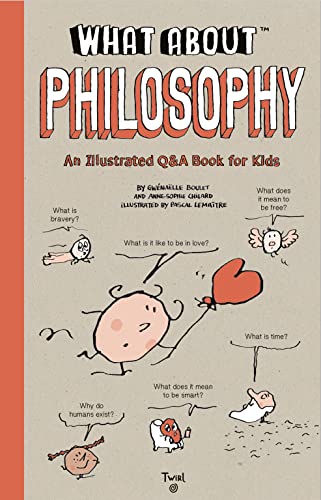What About: Philosophy (TW What About)

"Children deserve better than this and so does philosophy."
What About: Philosophy includes more pages on figuring out emotions than philosophical questions. In fact, none of the philosophical issues that have engaged people since antiquity appear here. There's nothing on what makes for a "good" life, on whether there is absolute good or only relative good, on what makes for a good government, on what nature teaches us. The questions Aristotle, Socrates, Plato, and later Kant, Hume, Nietzsche all wrestled with aren't included.
Other issues are presented but skirt thorny questions. For example, asking why humans exist, the three solutions offered all involve a God. There's no room for atheism in this philosophy, though a cartoon creature comments, "I don't believe in God." And "But if God created humans, who created God?" That's as far as it goes, with no further exploration of that possibility.
The section on freedom and free will avoids entirely the question of how things can be fated or determined/known by God with people still having responsibility for their actions. Instead the sense of freedom is narrowed to mean constraints, like doing homework and eating your vegetables.
Pages are devoted to Jealousy, Love, Anger, again all more about understanding feelings than exploring philosophy. Even the pages on Kindness, Sharing, and Making Mistakes don't encourage questions, but rather offer simplistic guides.
"Yes, it can be annoying, embarrassing, or sometimes very serious to make a mistake . . . No, it's not so bad to make a mistake! . . . Should we be afraid to make a mistake?"
Even wider off the mark is the section "What is the Purpose of History?" That's not the right question to ask, since there's no "purpose" to history at all. What the authors are clumsily trying to ask is "Why bother to learn history?" Again, they give the obvious, facile responses, such as "When we study the past, we understand that humans have always asked the same questions about life. We're not so different." A more philosophical question would be, who gets to tell/choose what becomes "history" and what gets forgotten? How does history shape culture, civilization, our daily lives?
Children deserve better than this and so does philosophy. What About Philosophy should be avoided by anyone truly looking for an introduction to philosophy, to the love of wisdom, to critical thinking about the world and our place in it. However, if you're looking for a quick guide to emotions with accessible graphic elements, this book has some useful pages.